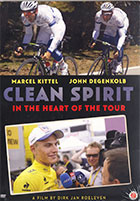
Clean Spirit 2014
Distributed by Icarus Films, 32 Court St., 21st Floor, Brooklyn, NY 11201; 800-876-1710
Produced by Pieter Van Huystee
Directed by Dirk Jan Roeleven
DVD, color, 88 min.
General Adult
Sports, Doping in Sports
Date Entered: 09/01/2015
Reviewed by Andy Horbal, University of Maryland LibrariesClean Spirit begins with opening titles explaining that the cycling team Argos Shimano was founded in 2008 with the goal of creating a change in a sports culture rocked by scandals related to the use of performance-enhancing drugs (PEDs), and that the team decided to specialize in the sprint as a means to achieving this goal. Subsequent scenes, which include the team’s top sprinters, Marcel Kittel and John Degenkolb, talking about how frustrating it is to be a successful, clean rider in an era when everyone is assumed to be cheating, and heavy-handed imagery such as a shot of Degenkolb reading a magazine article with the headline “Guilty,” set up the expectation that this mission will be the primary focus of the film.
Surprisingly, this turns out not to be the case: the emphasis soon shifts to documenting Argos Shimano’s experience at the 2014 Tour de France. Interviews with the team’s riders and trainers about their thoughts on PED use and other references to drugs are sprinkled throughout, but they take a backseat to race-related drama. The main storylines include a crash involving rider Tom Veelers, which the team believes was caused by a rival sprinter, Veelers’ subsequent struggle to overcome his injuries and finish the race, and Kittel blossoming into a superstar as he racks up stage wins.
This change in direction may be for the best as far as entertainment value is concerned. The rare glimpses behind the scenes of a Grand Tour, which range from riders launching into profanity-laced tirades against their coaches about what they perceive as shortcomings in the team’s race strategy to more quotidian (but no less fascinating) interactions with physicians in the team car and salary negotiations with promising young riders, are likely more appealing to fans of cycling than a screed against doping would have been. It does, however, raise questions about the film’s place in an educational media collection.
The extensive use of undefined jargon and lack of background information make Clean Spirit a poor introduction to cycling, and it never delves deeply enough into the differences in the culture of the sport before, during, and after the PED era to make it possible to assess Argos Shimano’s efforts to create change. Viewers with an interest in cycling will enjoy the opportunity to look back on the 2014 Tour de France through the eyes of one of its most successful teams, though, and as such the film does have value as an addition to recreational film collections.